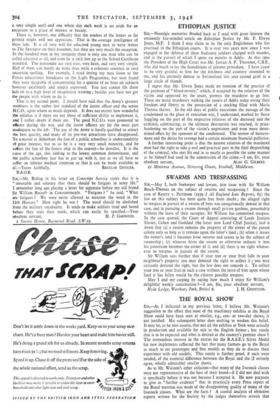ETHIOPIAN JUSTICE
Sta,—Nostalgic memories flooded back as I read with great interest the eminently fair-minded article on Ethiopian Justice by Mr. F. Elwyn Jones, M.P. I think I may claim to be the only Englishman who has practised in the Ethiopian courts. It is over two years now since I was engaged in the defence of three Sudanese .soldiers charged with murder, and in the pursuit of which I spent six months in Addis. At that time the President of the High Court was Mr. Justice A. F. Thavenot, C.B.E., who did much to lay the foundations of present procedure. I have cause to be very grateful to him for the kindness and courtesy extended to me, and his untimely demise in Switzerland last year caused grief to a large circle of friends.
I regret that Mr. Elwyn Jones made no mention of the practice of the payment of "blood-money," which, if accepted by the relatives of the victim and approved by the court, permits the murderer to go free. There are many murderers walking the streets of Addis today owing their freedom and liberty to the possession of a stocking filled with Maria Theresa thalers. In the old days of public executions the passage of the condemned to the place of execution was, I understand, marked by fierce haggling on the part of the respective relatives of the deceased and the criminal, culminating, as the ultimate destination was reached, in price- hardening on the part of the victim's negotiators and even more deter- mined offers by the sponsors of the condemned. The sorrow of bereave- ment and the desire for revenge had a certain minimum financial palliative.
A further interesting point is that the nearest relatives of the murdered man had the right to take t real and-practical part in the final despatching of the criminal, who met his end in as nearly as possible the same manner as he himself had used in the commission of the crime.—I am, Sir, your


































 Previous page
Previous page